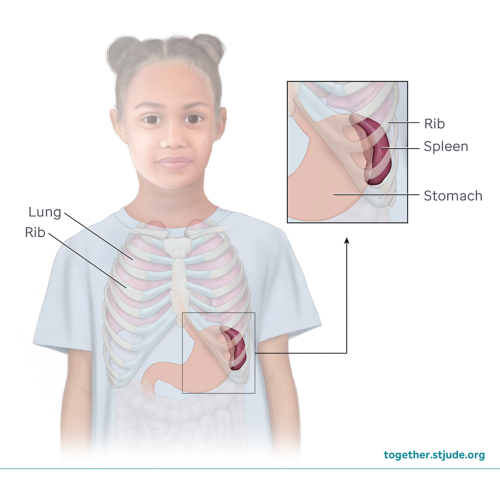A splenectomy is a surgery (operation) to remove the spleen. Your child might need a splenectomy if the spleen is damaged, diseased, or causing problems in the body.
The spleen is an organ on the left side of the body under the ribcage. It is about the size of a fist. The spleen works to:
- Fight infection
- Make white blood cells
- Store and filter blood
People can live normal, active lives without a spleen. But after spleen removal, the body is less able to defend against illness and infection. Follow your care team’s recommendations for preventing infections after splenectomy.
Your child might need a splenectomy if their spleen is damaged because of certain diseases or treatments. A splenectomy can also be used to treat certain health conditions. Reasons for splenectomy may include:
- Sickle cell disease: Sickle-shaped red blood cells can get trapped in the spleen and damage it.
- Enlarged spleen: If the spleen gets too large, it can break open and cause life-threatening bleeding.
- Radiation therapy: High doses of radiation to the abdomen can damage the spleen.
- Blood disorders: Removing the spleen can improve blood counts in certain types of blood disorders, such as hemolytic anemia, hereditary spherocytosis, and other disorders.
- Cancer: Removal of the spleen may be needed to treat a tumor or cancer that affects the spleen.
- Injury: Trauma or injury to the spleen can cause bleeding.
Your child’s care team will talk with you about the risks and benefits of a splenectomy. You will also meet with members of the surgery team. They will talk with you about the surgery and give you instructions for how to prepare for the surgery.
- Vaccines: At least 2 weeks before surgery, your child will get any needed vaccines. Talk with your child’s care team about the vaccines your child needs.
- Fasting guidelines: Your care team will give instructions for when to stop eating and drinking before the procedure. These guidelines are also known as NPO instructions. Your care team will also let you know any changes needed to your child’s medicines.
Your child will be given general anesthesia before surgery. This will cause a complete loss of consciousness, like a deep sleep. Your child will not be aware of pain during surgery.
There are 2 main types of procedures for splenectomy: laparoscopic or open.
Laparoscopic splenectomy
A laparoscopic splenectomy is a minimally-invasive procedure that involves 3–4 tiny cuts in your child’s belly. This procedure uses a small medical instrument (laparoscope) with a camera and light at the end. Doctors use it to look at tissues and organs inside the belly without making a large cut. This makes recovery faster and less painful than surgery with a bigger incision. It takes about 2–4 hours for this procedure.
Open splenectomy
In an open or traditional surgery, the doctor makes a larger incision (cut), usually in the middle or on the left side of the belly. They will take the spleen out and close the cut with stitches or staples. It takes about 1–2 hours for this procedure.
Your child may need to stay in the hospital for 1–2 days or longer after the procedure. This will depend on the type of surgery and other medical needs.
During this time, your care team will:
- Watch for complications such as bleeding and infection
- Manage pain
- Care for the incision
Your care team will give you instructions for how to care for your child at home. Be sure to follow these instructions. Talk to the care team if you have any questions.
Most children can go back to their normal activities about 2 weeks after a laparoscopic splenectomy. Recovery takes longer after an open surgery.
Possible risks of a splenectomy
Like any surgery, a splenectomy has some risks. During the procedure, the main risks are problems with anesthesia or injury to nearby organs. After the procedure, the most common problems are:
- Bleeding
- Blood clots
- Infection
When to call your care team
You should seek medical help if your child develops signs of an infection. An infection can be life-threatening if not treated immediately.
Call your doctor if you notice any of these signs in your child:
- Fever
- Redness, swelling, or pain
- Feeling very tired or weak
- Trouble breathing
- Unusual bleeding
Other organs in the body perform the same function as the spleen. A person can have a healthy life without a spleen. If your child’s spleen was removed, they are at increased risk for developing a serious infection. Your child may need to take daily medicine for life to help decrease the risk of infection.
Your child will need to take special care to stay healthy.
- Be sure your child takes all medicines as prescribed.
- Keep all medical appointments and have blood counts checked.
- Take steps to reduce the spread of germs.
- Get vaccines that your care team recommends.
- Have your child wear a medical alert bracelet or necklace.
- Let all health care providers know that your child does not have a spleen.
Questions to ask your care team




